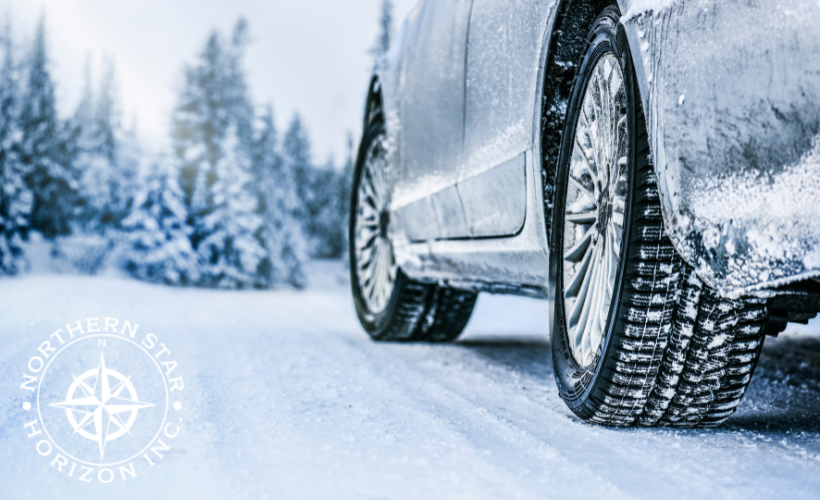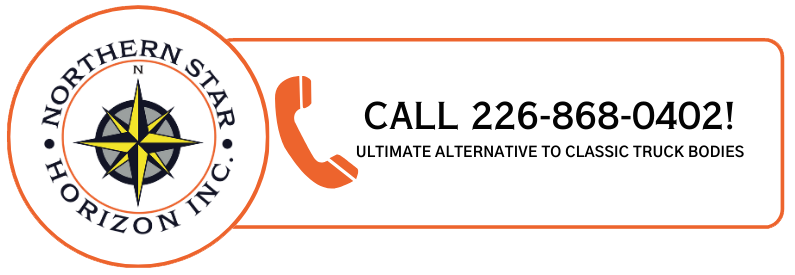7 Winter Trailer Safety Tips for Ontario Drivers | Stay Safe All Year Long

Winter is a complicated season for trailer drivers. One of the biggest challenges when dealing with winter is keeping the vehicle in great condition and driving safely while avoiding slippery roads due to ice or snow.
Colder months don’t mean that you have to stop driving your truck. Following a few of our tips in winter may give you a better time avoiding accidents or other problems.
We compiled seven great tips to help you have a safe driving experience during the winter. They will help you avoid risk while providing your vehicle with the maintenance it deserves.
Why Is Winter Driving So Dangerous?
There are many reasons why winter is such a complicated season for drivers of any kind. Essentially, cold temperatures can create hazards, including:
- Reduced visibility
- Ice and snow
- Wind
- Mechanical problems with the vehicle
- Long stopping distances
What this means is that all drivers must be more mindful of their driving habits. It’s not just about driving at a slow speed to prevent accidents, though. Drivers must also consider their vehicle’s current condition to ensure there are no problems with it before going on the road.
Follow These Recommendations in Winter to Stay Safe
Regardless of the type of trailer you’re hauling, you must ensure all preventive measures are taken before going outside. Listowel often expects considerable amounts of snowfall and rain during winter, so what can you do about that?
These seven prevention driving and towing safety tips will help you ensure the best conditions for everyone:
1. Inspect Your Trailer
It should go without saying that you must inspect your trailer thoroughly before going outside. Extremely cold temperatures can cause many issues, such as a drop in tire pressure.
You must also check your tires’ tread depth, as this will give you an idea of how much traction you can expect on slippery roads.
Another factor worth considering is the brake system. Considering that winter often leads to longer stopping distances, a faulty brake can easily cause an accident. Make sure your brakes are functioning properly before going on snowy or icy roads. Also, make sure that your brake controller is calibrated for snowy or icy conditions.
Your hitch and coupler should be free of rust or damage. Make sure that they’re securely connected before going out. Also, your safety chains should be in great condition.
Finally, check your lighting system, including brake lights, turn signals, and running lights. They should be fully operational and free of snow or ice. These lights will ensure that other vehicles can see you on the road and that you have better visibility.
2. Consider Winter Tires
Checking tire pressure and tread depth is a great way to prevent future problems while driving. However, if you tend to drive during bad weather or snowy conditions, it may be best to switch to snow tires.
These tires are known for having deeper treads and extra grooves, allowing you to manage snow much better. Consider talking to an expert to evaluate all options available to you.
3. Address Rust and Corrosion
Snow and ice can seriously accelerate corrosion in your trailer. This is because trapped moisture will continually go through freezing and thawing cycles. Not only will this cause a lot of stress on the metal, but it will also promote corrosion.
The first thing you can do is wash your trailer from time to time to remove grime, dirt, and salt. These are agents that can promote rust and corrosion.
In some cases, you may want to get a rust-inhibitor spray or wax coating for your metal surfaces. Applying protective coatings to your vehicle may make it last longer.
Don’t forget to inspect essential components for rust, such as nuts, bolts, and hinges. If there’s any damage, make sure to replace these parts immediately.
4. Make Sure You’re Storing the Trailer Correctly
Consider this tip if you don’t use your trailer frequently during the winter. Ideally, you should store your trailer in a covered location, such as a carport or garage. The longer you can shield the vehicle from snow and ice, the better.
Depending on how long you’re planning on storing the trailer, you may want to get tire cushions, as they will prevent flat spots on them.
Your vehicle’s battery will drain during storage, so make sure to disconnect it if you’re storing it for long periods.
5. Don’t Forget About Lubrication for Moving Parts
Cold temperatures often cause metal parts in trailers to stiffen and wear out. Not only will this make your vehicle harder to operate, but it can also make certain parts more likely to break.
The key to safety is to lubricate all moving parts correctly. You can use cold-weather lubricants for these moving parts, including hinges and locks. Make sure that the products you get are rated for low temperatures.
Electrical connections are also crucial to maintain, so consider getting dielectric grease to prevent them from getting corroded.
Make sure that doors, windows, and any other entry points for leaks are covered correctly. This can aid in keeping excessive moisture out.
6. Carry Emergency Supplies and Winter Towing Tools
You never know what can happen while driving in winter, so having the right towing equipment will always be worth it. We already talked about snow tires, but there are other tools and materials that may help you during these times. Snow chains are great if you’re travelling in rural areas, for example.
As for emergencies, getting a reliable kit will get the job done. You can equip your kit with as many essentials as you consider appropriate. We recommend ice scrapers, flashlights, blankets, and shovels. You should also get non-perishable food in case you get yourself involved in a very tough situation.
7. Always Keep Road Safety in Mind (and Check the Weather)
A great way to start is to load your trailer correctly. By distributing weight evenly, you can avoid accidents by promoting more stability. Also, you can get tie-downs or straps to prevent your cargo from shifting.
Preparing your route will contribute to your safety. One thing that will help during this process is checking weather reports. They will give you current and forecasted conditions, so that will give you an idea of how to prepare yourself.
We recommend only driving on roads in great condition. Also, keep in mind that these conditions may slow down your driving a bit, so never go out in a hurry. Allowing extra time for your route will account for any potential delays.
When you’re outside, remember to adjust your speed accordingly and maintain a safe distance from other vehicles. This will give you more than enough reaction time if something were to happen.
Stay Safe Throughout the Winter
Safe towing in the winter is about prevention, so these tips will give you more than enough to keep your vehicle in optimal condition.
If you’re interested in learning more about trailer towing tips or buying the perfect vehicle for your needs, don’t hesitate to contact our team at Northern Star Trailers. We have all the information you need to ensure your towing vehicle is in the best condition before going on a tough or slippery road.
The post 7 Winter Trailer Safety Tips for Ontario Drivers | Stay Safe All Year Long appeared first on Northern Star Horizon.
source https://northernstartrailers.ca/winter-trailer-safety-tips/

Comments
Post a Comment